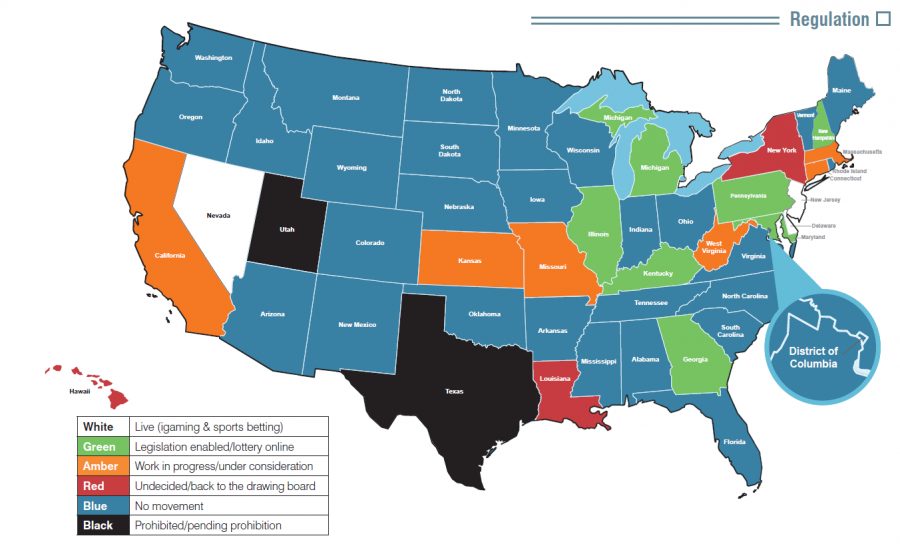State of the union: RI and WV bills head to governor
| By iGB Editorial Team
In this week's State of the Union, in partnership with Segev LLP, we find Rhode Island poised to legalise online wagering and West Virginia set to legalise online gaming, with bills in both states awaiting approval from their respective Governors. Elsewhere, Michigan Representative Brandt Iden has resumed efforts to legalise online betting and gaming in the state, new bills have been filed in Connecticut and Kansas, and the AGA is urging states to innovate when they regulate.

In this week’s State of the Union, in partnership with Segev LLP, we find Rhode Island poised to legalise online wagering and West Virginia set to legalise online gaming, with bills in both states awaiting approval from their respective Governors. Elsewhere, Michigan Representative Brandt Iden has resumed efforts to legalise online betting and gaming in the state, new bills have been filed in Connecticut and Kansas, and the AGA is urging states to innovate when they regulate.
Rhode Island online wagering awaits Governor’s signature
Mobile wagering in Rhode Island is awaiting approval from Governor Gina Raimondo to come into law, after the state’s House of Representatives passed a bill already approved by the Senate.
S37, introduced in January by Senate president Dominick Ruggerio and passed by the Senate in February, allows the Twin River casinos in Lincoln and Tiverton to launch online and mobile sports betting.
The casinos, currently the only places permitted to offer land-based betting in Rhode Island, must only offer the online services to customers that have registered for an account at the venue. They must also use geolocation technology to verify the players are betting within the state’s borders.
As with land-based wagering, 51% of sports betting revenue will be paid to the state, with a further 32% going to the authorised sports wagering vendor, and 17% going to the host facility. Land-based wagering in the state is powered by William Hill and International Game Technology (IGT), which paired up to secure the contract in August 2018.
West Virginia set for igaming launch
West Virginia is just one step away from becoming the fifth state to legalise online gambling, with a bill currently awaiting Governor Jim Justice’s signature.
House Bill 2934, which was introduced by Delegate Jason Barrett on February 12, has been passed by both chambers of the West Virginia legislature. Having passed the House in February, it was then passed by the Senate on March 8, the second-last day of the 2019 regular session by a vote of 26 in favour, and seven against.
As a result of minor tweaks made in the upper chamber, it then returned to the House for final approval, which was secured on March 9, with 78 Delegates voting in favour, 18 against and four abstentions.
It now passes to the Governor for final ratification, though Justice can allow the bill to pass into law without his signature, as he did with the state’s sports betting regulations. Should it become law, West Virginia would join Delaware, Nevada, New Jersey and Pennsylvania in regulating online gaming.
New Kansas bill – without integrity fee – filed
Kansas lawmakers are to run the rule over a new bill that would legalise sports betting in the state, but omits the integrity fee proposed by a competing bill.
Filed by the Committee on Federal and State Affairs, Senate Bill 222 would allow the Kansas Racing and Gaming Commission to issue licences to gaming facilities and racetracks interested in offering sports wagering services.
Punters would be able to place bets in-person at licensed venues, as well online or via mobile from anywhere inside the state’s boundaries. Wagering would be permitted on all professional and collegiate events.
In order to apply for a licence, the venue in question would need to be approved by the Kansas Lottery. The bill does not state how much licences would cost.
Licensees would be permitted to enter into a management contract with a third-party partner, subject to approval from the Commission.
The bill said any management contract would be subject to a provision whereby the state would receive 6.75% of sports wagering revenue. This would be paid into the Lottery Act Revenues Fund.

